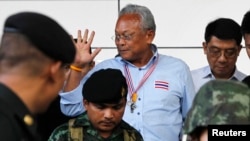Thailand's ruling military on Wednesday tried to ease concerns over those it placed in custody after declaring a coup last week, saying most of the detainees already have been freed.
Spokesman Werachon Sukondhapatipak said 253 people - including politicians, activists, journalists and scholars - were summoned by the army. He said 124 were released, 76 are still in custody, and 53 failed to report.
The army also aired video of many of the detainees, who said they had not been abused. The footage included Jatuporn Prompan, a "Red Shirt" protest leader who supported the government of ousted Prime Minister Yingluck Shinawatra.
"Right now, it's good. I've been treated well. I've never asked where this location is. Nobody knows where it is," said Jatuporn on the video.
Protest leaders who opposed Yingluck's government also appeared before police Wednesday for questioning. Luang Pu Buddha Issara, a Buddhist monk protest leader, said he is confident his name will be cleared.
"I believe we have done the right thing. We did not threaten to assault or kill anyone. We did not destroy the governmental buildings, did not lock down the government buildings, they were closed before we arrived. The NPOC (National Peace and Order Maintaining Committee) sent a letter to us citing security threats, but we have clear evidence," said the monk.
Protesters on both sides have continued to hold demonstrations in recent days, defying the army's orders and threat of arrest.
Despite the tensions, life has continued as normal in the capital. The military has loosened its curfew, which was in place from 10:00 pm to 5:00 am, to midnight to 4:00 am.
The army spokesman, Colonel Werachon Sukondhapatipak, told VOA on Tuesday that the military believes the country's "problem" can be traced to the influence of former Prime Minister Thaksin Shinawatra.
The colonel did not elaborate, but he said resolution of the country's difficulties "depends on [the cooperation of] all the conflict parties."
Populist Thaksin Shinawatra was prime minister from 2001 to 2006, when he was deposed in a coup on suspicion of corruption. The billionaire telecom tycoon lives in self-imposed exile in Dubai. His sister, Yingluck, who eventually replaced him as head of government, was removed from office earlier this month on suspicion of nepotism.
In other developments Tuesday, the Bangkok Post, under the headline "Coup Chief 'Requests' Easier Questions," reported General Prayuth Chan-ocha asked two of the country's best known military reporters to stop asking aggressive questions about the new government.
The paper quoted its military affairs reporter, Wassana Nanuam, and a second journalist as saying they were told the general was unhappy with public questions about the makeup of the military government and a time frame for new elections.
A spokesman for the general was quoted as saying "such a forceful style of asking is not appropriate" and could affect public confidence in the military government.
The paper said reporter Wassana also was asked to curb comments posted on her Facebook page that the military said could foster "conflict and divisions."
Spokesman Werachon Sukondhapatipak said 253 people - including politicians, activists, journalists and scholars - were summoned by the army. He said 124 were released, 76 are still in custody, and 53 failed to report.
The army also aired video of many of the detainees, who said they had not been abused. The footage included Jatuporn Prompan, a "Red Shirt" protest leader who supported the government of ousted Prime Minister Yingluck Shinawatra.
"Right now, it's good. I've been treated well. I've never asked where this location is. Nobody knows where it is," said Jatuporn on the video.
Protest leaders who opposed Yingluck's government also appeared before police Wednesday for questioning. Luang Pu Buddha Issara, a Buddhist monk protest leader, said he is confident his name will be cleared.
"I believe we have done the right thing. We did not threaten to assault or kill anyone. We did not destroy the governmental buildings, did not lock down the government buildings, they were closed before we arrived. The NPOC (National Peace and Order Maintaining Committee) sent a letter to us citing security threats, but we have clear evidence," said the monk.
Protesters on both sides have continued to hold demonstrations in recent days, defying the army's orders and threat of arrest.
Despite the tensions, life has continued as normal in the capital. The military has loosened its curfew, which was in place from 10:00 pm to 5:00 am, to midnight to 4:00 am.
The army spokesman, Colonel Werachon Sukondhapatipak, told VOA on Tuesday that the military believes the country's "problem" can be traced to the influence of former Prime Minister Thaksin Shinawatra.
The colonel did not elaborate, but he said resolution of the country's difficulties "depends on [the cooperation of] all the conflict parties."
Populist Thaksin Shinawatra was prime minister from 2001 to 2006, when he was deposed in a coup on suspicion of corruption. The billionaire telecom tycoon lives in self-imposed exile in Dubai. His sister, Yingluck, who eventually replaced him as head of government, was removed from office earlier this month on suspicion of nepotism.
In other developments Tuesday, the Bangkok Post, under the headline "Coup Chief 'Requests' Easier Questions," reported General Prayuth Chan-ocha asked two of the country's best known military reporters to stop asking aggressive questions about the new government.
The paper quoted its military affairs reporter, Wassana Nanuam, and a second journalist as saying they were told the general was unhappy with public questions about the makeup of the military government and a time frame for new elections.
A spokesman for the general was quoted as saying "such a forceful style of asking is not appropriate" and could affect public confidence in the military government.
The paper said reporter Wassana also was asked to curb comments posted on her Facebook page that the military said could foster "conflict and divisions."





